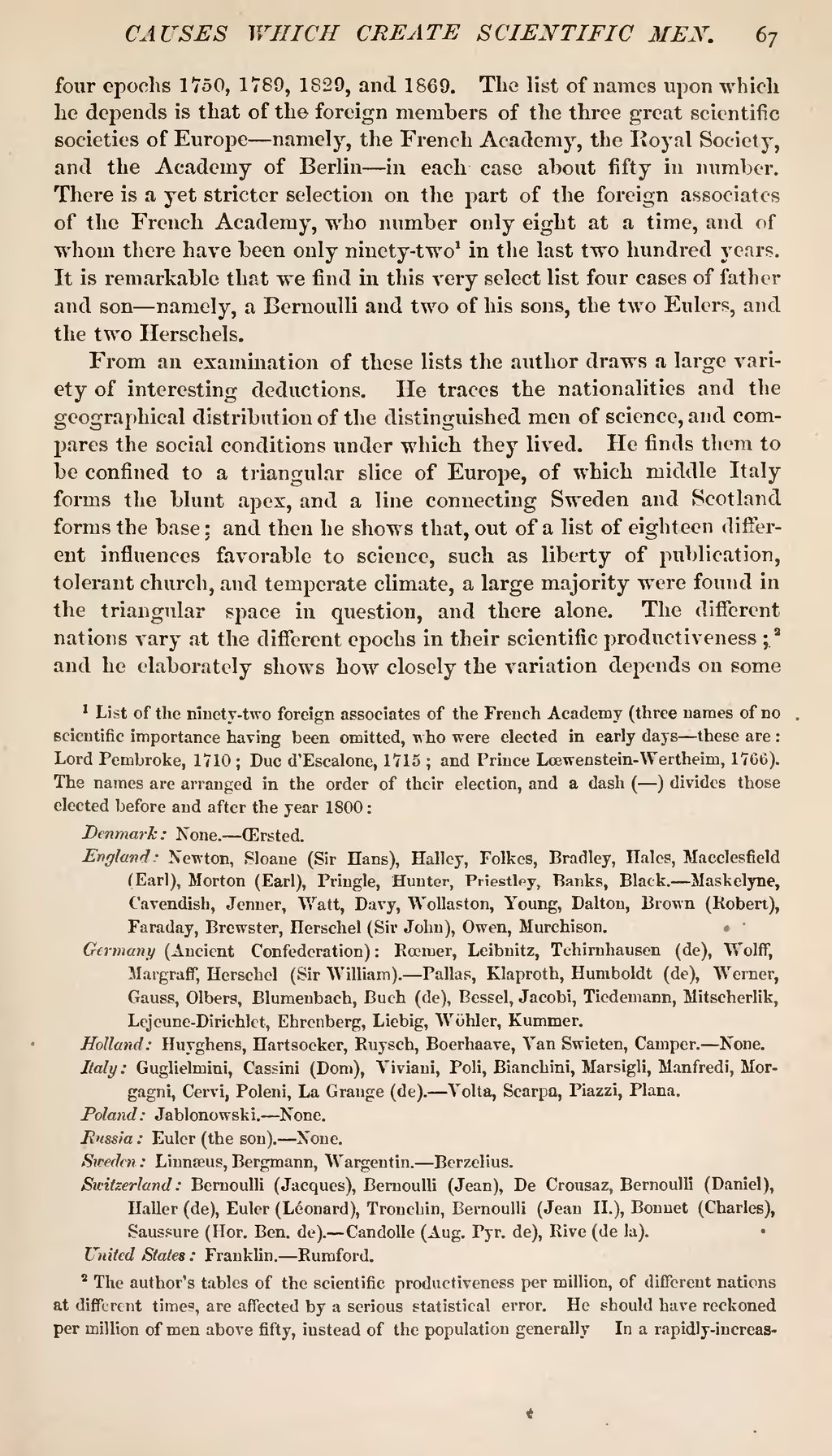four epochs 1750, 1789, 1829, and 1869. The list of names upon which he depends is that of the foreign members of the three great scientific societies of Europe—namely, the French Academy, the Royal Society, and the Academy of Berlin—in each case about fifty in number. There is a yet stricter selection on the part of the foreign associates of the French Academy, who number only eight at a time, and of whom there have been only ninety-two[1] in the last two hundred years. It is remarkable that we find in this very select list four cases of father and son—namely, a Bernoulli and two of his sons, the two Eulers, and the two Herschels.
From an examination of these lists the author draws a large variety of interesting deductions. He traces the nationalities and the geographical distribution of the distinguished men of science, and compares the social conditions under which they lived. He finds them to be confined to a triangular slice of Europe, of which middle Italy forms the blunt apex, and a line connecting Sweden and Scotland forms the base: and then he shows that, out of a list of eighteen different influences favorable to science, such as liberty of publication, tolerant church, and temperate climate, a large majority were found in the triangular space in question, and there alone. The different nations vary at the different epochs in their scientific productiveness;[2] and he elaborately shows how closely the variation depends on some
- ↑ List of the ninety-two foreign associates of the French Academy (three names of no scientific importance having been omitted, who were elected in early days—these are: Lord Pembroke, 1710; Due d'Escalone, 1715; and Prince Loewenstein-Wertheim, 1766). The names are arranged in the order of their election, and a dash (—) divides those elected before and after the year 1800:
Denmark: None.—Œrsted.
England: Newton, Sloane (Sir Hans), Halley, Folkes, Bradley, Hales, Macclesfield (Earl), Morton (Earl), Pringle, Hunter, Priestley, Banks, Black.—Maskelyne, Cavendish, Jenner, Watt, Davy, Wollaston, Young, Dalton, Brown (Robert), Faraday, Brewster, Herschel (Sir John), Owen, Murchison.Germany (Ancient Confederation): Rœmer, Leibnitz, Tchirnhausen (de), Wolff, Margraff, Herschel (Sir William).—Pallas, Klaproth, Humboldt (de), Werner, Gauss, Olbers, Blumenbach, Buch (de), Bessel, Jacobi, Tiedemann, Mitscherlik, Lejeune-Dirichlet, Ehrenberg, Liebig, Wöhler, Kummer.Holland: Huyghens, Hartsoeker, Ruysch, Boerhaave, Van Swieten, Camper.—None.Italy: Guglielmini, Cassini (Dom), Viviani, Poli, Bianchini, Marsigli, Manfredi, Morgagni, Cervi, Poleni, La Grange (de).—Volta, Scarpa, Piazzi, Plana.
Poland: Jablonowski.—None.
Russia: Euler (the son).—None.
Sweden: Linnaeus, Bergmann, Wargentin.—Berzelius.
Switzerland: Bernoulli (Jacques), Bernoulli (Jean), De Crousaz, Bernoulli (Daniel), Haller (de), Euler (Léonard), Tronchin, Bernoulli (Jean II.), Bonnet (Charles), Saussure (Hor. Ben. de).—Candolle (Aug. Pyr. de), Rive (de la).United States: Franklin.—Rumford.
- ↑ The author's tables of the scientific productiveness per million, of different nations at different times, are affected by a serious statistical error. He should have reckoned per million of men above fifty, instead of the population generally In a rapidly-increas-

